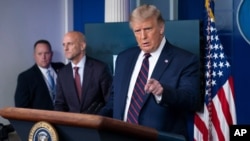Calling it “a truly historic announcement,” U.S. President Donald Trump on Sunday hailed a federal government emergency authorization for use of convalescent blood plasma that he declared would “save countless lives” of coronavirus patients.
Trump and his health secretary, Alex Azar, at a briefing for reporters, noted a 35% decrease in mortality among those younger than 80 who were not on a respirator, a month after receiving the treatment early in the course of their disease.
“We dream in drug development of something like a 35% mortality reduction,” Azar, the secretary of Health and Human Services, said alongside the president. “This is a major advance in the treatment of patients.”
Convalescent blood plasma comes from patients who have recovered from the coronavirus and is rich in antibodies. It has been used to treat tens of thousands of COVID-19 patients in the U.S.
Just before the president’s comment, the Food and Drug Administration announced it has authorized –- but technically not fully approved — the use of blood plasma containing antibodies from patients who have recovered from COVID-19.
That announcement came a day after Trump, on Twitter, declared that "The deep state, or whoever, over at the FDA is making it very difficult for drug companies to get people in order to test the vaccines and therapeutics."
In his tweet he said: "Obviously, they are hoping to delay the answer until after November 3rd. Must focus on speed, and saving lives!”
Trump was referring to the date of the presidential election in which he faces former Vice President Joe Biden, the Democratic Party nominee.
The commissioner of the FDA, Dr. Stephen Hahn, told reporters that the agency had determined that the blood plasma treatment was worth granting the emergency authorization following an analysis of 20,000 of the 70,000 patients who had received the treatment, as well as based on other studies.
A “35% improvement in survival is a pretty substantial clinical benefit,” he added. “We’ve seen a great deal of demand for this from doctors around the country.”
Plasma treatment has been used safely against other diseases, including Ebola and diphtheria, but scientists — including some who work for the U.S. government — are more cautious about it as a treatment for the coronavirus, saying the results are mixed and there is no proof yet that it works against COVID-19.
After Trump was asked by a reporter about somewhat contradictory language that he and Hahn had expressed about blood plasma’s efficacy, the president –- who had called the plasma treatment “very effective” — ended the 18-minute news conference after taking only three questions.
A spokesman for the American Society for Biochemistry and Molecular Biology, said in a statement that Trump shows an unwillingness to listen to medical experts, and that "breakthroughs require the collection of data" to ensure safety and efficacy of treatments.
"This process is necessary to ensure our safety and to ensure that a treatment isn't worse than the disease," said the spokesman, Ben Corb. "I am deeply concerned by this action and concerned about the timing."
The announcement was made on the eve of the Republican party’s national convention which will formally renominate Trump for president.
Scott Gottlieb, Trump's first FDA commissioner, on Sunday, appearing on CBS’ “Face the Nation” program, said that plasma is "probably beneficial" for coronavirus patients, while noting the concerns about the lack of evidence.
"I think some people wanted to see more rigorous data to ground that decision," Gottlieb said.
Notably absent from Sunday’s news conference held by the president: the director of the National Institute of Allergy and Infectious Diseases, Dr. Anthony Fauci, who is a member of the White House coronavirus task force.
Fauci was among those who intervened to halt an FDA emergency use authorization, the New York Times reported last week. Fauci and others, according to the newspaper, argued that the emerging data on the treatment was too weak,
Trump, mindful of accusations from Biden and other Democrats that he has bungled the handling of the coronavirus in the United States, has often said that treatment for the infectious disease is nearing and has contended that the virus will simply disappear.
Numerous U.S. health experts have said that a COVID-19 vaccine will not be available before the end of the year or into early 2021 and then only if tests on the efficacy of the vaccine now starting in several countries, including the United States, prove successful.
The coronavirus pandemic has killed nearly 177,000 people in the United States and infected about 5.7 million — more than in any other country, according to Johns Hopkins University data.






